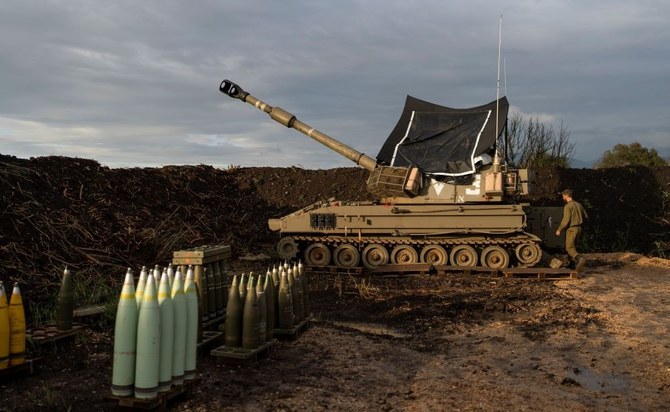
- ARAB NEWS
- 15 Jul 2025

BEIRUT: In an unprecedented development in the ongoing hostilities between Israel and Hezbollah on the southern Lebanese front, the Israeli army said on Tuesday that “its special forces infiltrated southern Lebanon and cleared mines in the village of Aita Al-Shaab.”
Hezbollah quickly denied the incident, which would represent a significant escalation of a conflict that now has been going on for 101 days alongside the Israeli military action in Gaza. The militant group said its “forces are present along the border strip and are capable of confronting any attempt.”
A source from the UN Interim Force in Lebanon said: “We have not received any report of Israeli infiltration across the border with Lebanon and we are currently investigating the matter.”
Local media reports from the border region described “an attempt by a force of three Israeli soldiers to breach the barbed wire fence separating Lebanon and the Israeli side, and infiltrate toward Lebanese territory, but Hezbollah members detected them and prevented them from doing so, so they withdrew.”
Meanwhile Israeli aircraft dropped leaflets over the town of Kfarkela for the second time. Addressed to “residents of the south,” they said that “missiles are being launched from this area by the terrorist Hezbollah. Such terrorist operations will lead to a harsh response. For your safety, do not be a party to terrorist acts in your backyards.”
Some residents who have not yet fled the area scoffed at the leaflets on social media, while others decided to leave and seek refuge elsewhere. More than 75,000 people so far have been displaced, moving away from villages and towns in the deep south for fear of becoming caught up in fighting along the border.
Israeli air attacks grew in intensity in border regions on Tuesday, with more than 20 strikes targeting areas around Hula, Wadi Saluki, Wadi Hujeir, the Rab Thalathine-Taybeh road, and Aita Al-Shaab, causing terror among residents as buildings shook.
In addition, Israeli artillery shelling targeted Moutran Hill in Hamames, Wadi Al-Bayad and Mays Al-Jabal, and a Merkava tank reportedly bombarded the town of Kfarkela with phosphorus shells. A house in the border town of Abbasiya was hit by a tank attack and caught fire.
There were fears for Mahmoud Yaqoub, a shepherd, and his sister who went missing during the Israeli raids on the village of Hula and its surrounding areas. After a few hours, however, he resurfaced and posted a message on social media saying that they had “sought refuge in a cave beneath a mountain.”
On Tuesday morning, sirens sounded in eight Israeli settlements in Upper Galilee as the Israeli army suspected a drone attack had been launched from Lebanon. In the afternoon, sirens sounded in Ramot Naftali, a settlement near the border.
Israeli forces said they have “targeted 150 Hezbollah cells in southern Lebanon responsible for launching missiles and drones since the beginning of the confrontations.”
The Israeli Public Broadcasting Corporation reported “a major army assault in Wadi Saluki, south of Lebanon” in which “dozens of targets were simultaneously attacked.”
Hezbollah said it attacked “a group of Israeli soldiers to the east of the Evin Menachem settlement using missiles.”
During a meeting with the Canadian ambassador to Lebanon, Stefanie McCollum, Lebanon’s caretaker foreign minister, Abdallah Bou Habib, said that authorities in Beirut recently sent a letter to the UN in an attempt to take the initiative and develop a serious vision to ensure the stability of the country’s southern borders.
“We expect active countries to support this initiative to safeguard regional peace and security, and prevent any further escalation of conflict in the Middle East,” he added
The letter, sent about a week ago, reads: “We should not seek half-solutions in our region. Give peace a chance through the full and comprehensive implementation of international resolutions that support the creation of an independent Palestinian state, with East Jerusalem as its capital.”
It called on the UN Security Council to ensure the full implementation of Resolution 1701, and secure international guarantees. Resolution 1701 was adopted by the council in 2006 with the aim of resolving the war that year between Israel and Hezbollah.
The letter also urged the UN to support efforts by “the Lebanese state to extend its authority over the entire Lebanese territory by strengthening the armed forces and enhancing their deployment south of the Litani River in cooperation with UNIFIL, to ensure that no weapons remain without the approval of the Lebanese government.”